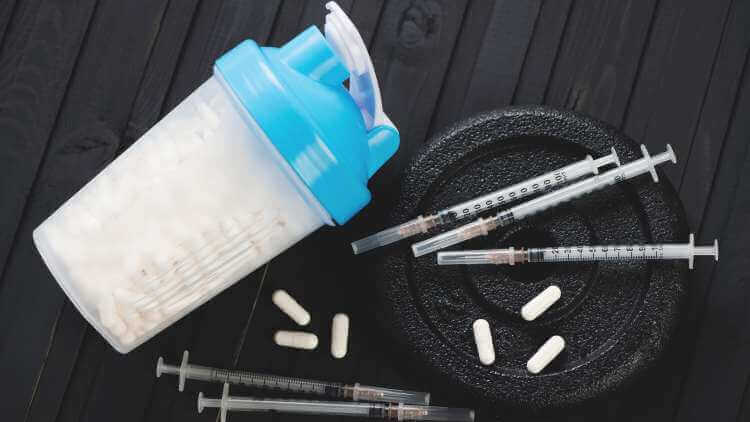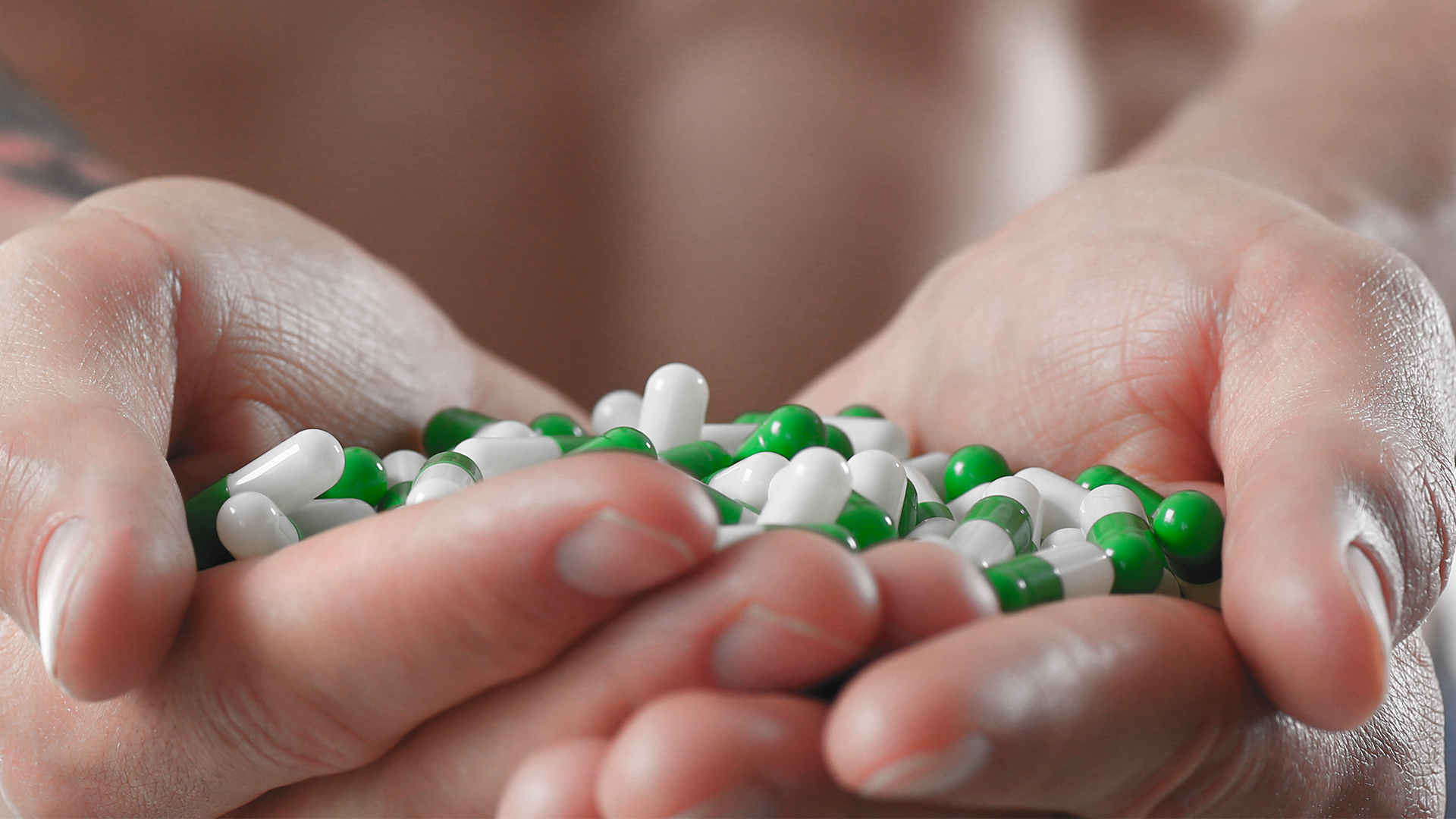DMAA (1 3 Dimethylamylamine) is a popular pre-workout and weight loss supplement due to its effect on your central nervous system. Is this supplement safe and legal to use? And what DMAA side effects do you have to be aware of? Find out in this DMAA review.
- What is DMAA?
- Is it Legal to Use?
- How DMAA Works
- Dangers and Side Effects of 1-3 Dimethylamylamine
- Why is DMAA Used in Pre Workouts?
- What Popular Products Contain DMAA?
- What are Other Stimulants Similar to DMAA?
DMAA (1-3 Dimethylamylamine) Usage in Pre-Workout Supplements
When it comes to notorious pre-workout, weight loss, and energy supplements, few ingredients have the reputation of DMAA. Categorized as a derivative of amphetamine, DMAA (1-3 dimethylamylamine) has a chemical structure and list of effects that produce a similar effect on the body as adrenaline, a stress response hormone, and ephedrine, a central nervous system stimulant.
But what exactly is DMAA pre-workout, and why does it spark such heated debates among fitness enthusiasts and health experts alike? The conversation surrounding DMAA is as intense as its effects, often compared to the spirited debates like EAA vs BCAA.
Understanding the Controversy
The significant and potentially fatal risks associated with DMAA are a major cause for concern. Critics argue these dangers should overshadow any potential benefits, questioning why there's any debate at all. Yet, defenders, including some researchers, suggest that these risks are primarily due to misuse rather than the compound itself.
Consumers find themselves in a whirlwind of conflicting information, understandably filled with questions. Why were DMAA pre-workouts so popular? What are the real dangers presented by this compound?
Objective Analysis
The key to understanding DMAA lies in an objective analysis. By examining the data and listening to expert opinions, one can begin to unravel this complex discussion. While DMAA mimics the effects of adrenaline and ephedrine, it's crucial to weigh these effects against potential health implications.
In conclusion, DMAA pre-workouts have made their mark in the supplement industry, but it's vital to approach them with informed caution. The goal is not just to understand what DMAA is, but to make educated decisions about its use.
What is DMAA?
DMAA can also be found on product packaging under one of the following names:
- 1,3-DMAA
- 1,3-Dimethylamylamine
- 1,3-Dimethylpentylamine
- 2-Amino-4-methylhexane
- 2-Hexanamine, 4-methyl- (9CI)
- 4-Methyl-2-hexanamine
- 4-Methyl-2-hexylamine
- Dimethylamylamine
- Geranamine
- Methylhexanamine
- Methylhexaneamine
DMAA, or 1,3-dimethylamylamine, is a synthetic compound originally developed as a nasal decongestant. Over time, it found a new role in the world of dietary supplements, primarily used for its stimulant effects.
However, due to its potent stimulant properties, DMAA has sparked significant regulatory attention. According to the
Moreover, DMAA is banned in several countries worldwide, including
Uses of DMAA
DMAA gained popularity for its ability to enhance workout performance and assist in fat loss. Here's how it was typically used:
-
Energy Boosting: As a powerful stimulant, DMAA was often included in pre-workout supplements to help increase focus, energy, and overall performance during exercise sessions.
-
Fat Burning: Known for its thermogenic properties, DMAA was also a key ingredient in various fat-burning products. It was believed to help enhance fat oxidation and aid in appetite suppression.
Safety and Regulations
Despite its benefits, DMAA's safety has been a subject of concern. Here's a summary of its legal status and associated risks:
-
Side Effects: Users reported several side effects, such as cardiovascular complications, central nervous system stimulation, and sleep disturbances.
-
Regulatory Actions: Due to these safety concerns, DMAA faced significant regulatory actions. It has been banned in many countries, including a prohibition in sports by the World Anti-Doping Agency (WADA) and its listing as a controlled substance in places like Australia. The FDA also considers DMAA illegal for sale as a dietary ingredient in the U.S.
Alternatives to DMAA
Given the regulatory landscape and potential side effects, many individuals now consider safer alternatives. Popular substitutes include caffeine, L-Theanine, TeaCrine®, and Beta-Alanine, which can provide energy-boosting effects without the associated risks.
Conclusion
Before considering DMAA or any stimulant-based supplements, it's crucial to consult with healthcare professionals and review its legal status in your region. While DMAA once held a prominent position in the supplement industry, understanding its uses and implications is key to making informed decisions about your health and fitness goals.
Origins of DMAA: Is It Naturally Derived?
DMAA, or 1,3-dimethylamylamine, is a synthetic compound. Despite claims by some early supplement marketers suggesting that DMAA comes from natural sources like the geranium plant (Pelargonium graveolens), this connection lacks strong scientific backing. Historically, geraniums have been prominent in the perfume industry for their aromatic properties. However, the assertion that DMAA is extracted from this plant does not hold up under scrutiny.
Scientific Findings
Research, including a notable study by Pieter in 2012, has largely debunked the notion that DMAA is naturally derived from geraniums. Instead, evidence shows that the DMAA found in dietary supplements is typically manufactured through synthetic processes. Originally, DMAA was introduced as a synthetic pharmaceutical, specifically used as a nasal decongestant.
A Historical Perspective on DMAA
Understanding DMAA's history provides insight into its current standing in the supplement industry and regulatory environment. DMAA first appeared in 1948 as a nasal decongestant, and subsequent studies in the 1940s and 1950s highlighted its similarities to ephedrine and amphetamine. However, by the 1970s, doubts about its efficacy led to the withdrawal of medical use approval.
In 1996, some research suggested DMAA might be found in geranium oil, but this was later challenged. The World Anti-Doping Agency banned DMAA in 2010, and that year also brought reports of adverse health events linked to its use. By 2011, Canada had banned DMAA, with further incidents, including fatalities, underscoring its risks.
Throughout the 2010s, various studies raised questions about DMAA's natural occurrence and highlighted significant safety concerns, leading the U.S. Food and Drug Administration in 2012 to declare DMAA-containing products illegal, demanding their removal from the market.
Conclusion
In summary, while the idea of DMAA being naturally sourced may appeal to some, scientific research firmly supports its synthetic origins. When encountering DMAA in supplements, it's important for consumers to be aware of its man-made nature.
.
Is it Legal to Use?
According to the Food and Drug Administration website, in the United States of America, DMAA is not a legal substance to be used for dietary products or prescription medication. While it was once a popular nasal decongestant, much like DMHA, it has been banned by the FDA for all uses.
The FDA has taken action to ensure DMAA-based products have been pulled from store shelves and online marketing: the organization contacted businesses promoting DMAA products, requesting that they discontinue them. While most companies did cooperate, those that did not were administratively detained.
The most famous examples of DMAA-based products being pulled by the FDA were OxyElite Pro and Jack3d from the brand USPLabs. This happened after the company refused to voluntarily comply with FDA orders.
Despite this ban, there is a chance that you may come across supplements and medications that contain DMAA, especially if you’re shopping online or in other countries. The FDA warns against buying and using any products that contain the compound due to DMAA side effects, which include chest tightness, shortness of breath, anxiety, and heart attack.
Understanding the Importance of Professional Consultation and Legal Status Checks for DMAA
When considering the use of substances like DMAA or similar ingredients, it's crucial to ensure your safety and legality. Here's why:
-
Health and Safety Concerns:
- Expert Guidance: Consulting with healthcare professionals is essential because they can assess your personal health history and provide advice tailored to your specific needs. DMAA has been associated with several health risks, including increased blood pressure and heart problems.
- Risk Mitigation: Professionals can help identify any potential interactions with other supplements or medications you might be taking, reducing the risk of adverse effects.
-
Legal Implications:
- Varying Regulations: The legal status of DMAA varies around the world and can change over time. Some countries have banned it, while others might have specific restrictions.
- Compliance: By checking the current legal status, you can ensure that you are in compliance with local laws, avoiding any legal repercussions.
-
Quality Assurance:
- Reliable Products: Professionals can guide you to products that have been tested and certified by reputable third-party organizations. This can ensure product purity and that you are indeed getting what is advertised.
-
Improved Results:
- Optimal Use: Consulting with experts can help you understand the effective and safe ways to use such ingredients, potentially enhancing their benefits while minimizing unwanted side effects.
In summary, taking the step to consult professionals and verify the legal status before using DMAA ensures not only your safety but also helps in making informed decisions that comply with legal standards.
Legal Status of DMAA in Various Regions and Organizations
The legal landscape surrounding DMAA (1,3-dimethylamylamine) is quite complex, reflecting varying stances across different countries and regulatory bodies.
United States
In the U.S., DMAA is not approved as a dietary supplement ingredient. The
Australia
Australia classifies DMAA as a Schedule 10 substance under the
New Zealand and Canada
These countries have followed a similar trajectory to Australia, with bans in place on the use and distribution of DMAA-containing products.
Military Use
The US military enacted a precautionary ban on DMAA in 2012, responding to concerns about its safety, even in the absence of conclusive evidence of harm.
Sports Organizations
On the global sports stage, DMAA is prohibited by the
Summary
Overall, the consensus among various countries and organizations has been to restrict or prohibit DMAA due to safety concerns. This reflects a cautious approach to its use, especially in environments related to health and sports.
How DMAA Works?
DMAA (1,3-dimethylamylamine) is a compound known for its dual role as a vasoconstrictor and central nervous system stimulant, making it a popular choice in pre-workout supplements. However, it's essential to understand its physiological effects to weigh the potential benefits against the risks.
Sympathomimetic and Stimulatory Effects
DMAA mimics neurotransmitters like epinephrine and norepinephrine in the sympathetic autonomic nervous system. This triggers the body's "fight or flight" response, releasing adrenaline and activating the brain's reward center similar to dopamine. These actions can enhance focus, alertness, and energy levels during workouts, theoretically boosting physical performance.
Vasoconstriction and Blood Pressure
While DMAA is considered a vasoconstrictor, it narrows blood vessels and arteries, raising blood pressure. For individuals with cardiovascular health issues, including hypertension, this can be hazardous. Studies indicate that DMAA significantly increases heart rate and blood pressure, and when combined with other stimulants like caffeine, these effects can be amplified, posing serious health risks.
- Unsafe Spikes in Blood Pressure: Users with pre-existing cardiovascular conditions could face hospitalization due to unsafe spikes in blood pressure and heart rate. Experts caution that this could lead to severe complications, such as heart attacks.
Dangers and Side Effects of 1 3 Dimethylamylamine
The physiological changes induced by DMAA come with a host of potential side effects:
-
Nausea and Vomiting: Many users report nausea leading to vomiting, especially when DMAA is consumed on an empty stomach. This could be due to its harsh impact on the central nervous system and stomach lining.
-
False Positive Result: DMAA can cause false positives for amphetamines in drug tests, leading to bans or suspensions in athletic organizations, even if the user hasn’t consumed any banned substances.
-
Liver Health: DMAA has been found to have a hepatotoxic effect, damaging the liver. Some cases have resulted in the need for liver transplants, with severe outcomes including death.
-
Mental Health: By pushing the body into a continuous "fight or flight" mode, DMAA can exacerbate stress, anxiety, and mood swings. Prolonged use may worsen pre-existing mental health issues, such as depression.
Conclusion
While DMAA may offer temporary boosts in workout performance due to its stimulatory effects, the potential for severe physiological and psychological side effects cannot be overlooked. Anyone considering its use should carefully evaluate these risks, particularly if they have underlying health conditions or are engaged in high-intensity training.
Why is DMAA Used in Pre Workouts?

Before it became a banned substance, DMAA powder pre-workouts were a favorite due to their effect on energy and performance. Here are the most popular reasons why DMAA was used in pre workout supplements.
- Energy Booster: Studies show that DMAA-based supplements can increase energy levels by stimulating the central nervous system, promoting the increase in blood pressure and releasing adrenaline. One of the primary reasons that DMAA was used in so many pre-workout supplements is that it has been shown to boost energy levels and support workout performance (as we’ll see below).
- Weight Loss: One study found that a DMAA supplement was able to promote fat oxidation and weight loss over the course of an eight-week trial. Aside from having a direct impact on burning fat, DMAA can increase energy levels, thereby supporting caloric expenditure.
- Nootropic: For students, DMAA was a popular nootropic or brain-boosting supplement. Studies show that when subjects took the DMAA-based supplement 30 minutes before a test, it resulted in improved memory, visual processing speed, and reaction time. However, researchers made a note that the improvement was average and not above and beyond. For example, supplementing with caffeine would produce the same response.
- Athletic Performance: An animal-based study with a DMAA supplement found that the physical performance of the subjects significantly improved. Rats given the supplement were shown to improve in running distance and overall running time.
What Benefits Does DMAA Provide for Bodybuilding?
DMAA, widely favored by bodybuilders, boasts several advantages that cater specifically to enhancing workout performance and results:
-
Energy Boost: Serving as a powerful stimulant, DMAA can ramp up your energy levels. This surge in vitality is particularly beneficial for powering through high-intensity training sessions.
-
Sharp Focus: Many athletes report sharpened focus when using DMAA, allowing for concentration that can sustain demanding exercises, ensuring every rep and set is executed with precision.
-
Fat Burning Aid: Known for its thermogenic effects, DMAA helps increase metabolic rate, making it an effective component for burning fat. This is especially useful when aiming to shed excess pounds during a cutting phase.
-
Improved Endurance: Users often feel an enhanced ability to push past normal limits. With DMAA, there's potential for prolonged endurance, translating to more productive workouts with less perceived physical strain.
-
Intense Sensation: Unlike many pre-workout supplements that expand blood vessels, DMAA causes vasoconstriction. This effect may amplify the perception of workout intensity, motivating some users to push themselves harder.
While DMAA offers these appealing benefits, it's important to consider its powerful effects and ensure it's used appropriately in any fitness regimen.
DMAA aids fat loss through several key mechanisms:
-
Thermogenesis: DMAA can boost the body's metabolic rate, leading to increased energy expenditure. This thermogenic effect helps burn more calories and, consequently, fat.
-
Appetite Suppression: Users have reported that DMAA can reduce appetite, which may lead to lower calorie intake. This is beneficial for anyone aiming to create a calorie deficit for effective weight loss.
-
Increased Energy: As a powerful stimulant, DMAA elevates energy levels, enabling individuals to maintain or even enhance their exercise intensity and duration, which results in additional calories burned.
-
Enhanced Fat Oxidation: There is evidence suggesting that DMAA may increase the rate at which the body utilizes fat for energy, particularly during physical activities.
By leveraging these mechanisms, DMAA can effectively support weight loss efforts, offering a multi-faceted approach to burning fat and increasing energy levels.
Recommended Doses and Timing for DMAA Consumption
When DMAA was widely available in dietary supplements, dosages typically ranged between 25 mg and 75 mg per serving. The specific amount often varied based on the product's purpose, such as pre-workout or fat-burning supplements. For beginners, it was advisable to start with half a serving to gauge tolerance before progressing to a full serving.
Timing Considerations
Timing was crucial for maximizing the benefits of DMAA. Most users opted to take DMAA supplements about 20-30 minutes before a workout to harness its stimulant effects. Given its energizing properties, it was best to avoid taking these supplements in the evening or near bedtime to prevent potential sleep disturbances.
Understanding Safe Dosages
While dosing guidance was often unclear, a study in BMC Pharmacology and Toxicology indicated that 25 milligrams of DMAA appeared safe with no significant impact on heart rate, blood pressure, or body temperature. However, dosages between 375-750 mg were associated with adverse effects, highlighting the importance of cautious consumption.
What Popular Products Contain DMAA?
The majority of products that contain DMAA are dietary supplements specifically for weight loss and pre-workout energy. Here are a few famous examples:
- USP Labs: Oxy Elite Pro and Jack3D
- Fahrenheit Nutrition: Lean Efx
- SEI Pharmaceuticals: MethylHex 4,2
- Nutrex Research: Hemo Rage Black, Lipo-6 Black Ultra Concentrate, Lipo-6 Black, Lipo-6 Black Hers Ultra Concentrate, and Lipo-6 Black Hers
- Line One Nutrition: Fat Burning Lean Pills
To see the full list of companies that were sent a cease and desist letter, click here.
What are Other Stimulants Similar to DMAA?
If you are a former DMAA user and you're looking for something comparable without the side effects, or you are seeking a proven and safe energy booster to start with, here are a few options to consider:
-
Caffeine: A staple of pre-workout supplements, caffeine can produce similar effects to DMAA in terms of energy boosting, increased nootropic effects, and performance enhancement.
-
Synephrine: More commonly referred to as bitter orange extract, synephrine is a popular weight loss ingredient that has been shown in several studies to promote fat loss, calorie expenditure, and weight management.
-
Hordenine: Structurally similar to synephrine, hordenine is another compound often found in both weight loss and performance-enhancement supplements.
For those exploring further options, there are additional alternatives that can complement or substitute DMAA effectively:
-
L-Theanine: Known for its calming effects, when paired with caffeine, it provides a balanced energy boost without jitters, making it ideal for sustained focus.
-
Teacrine®: Think of this as caffeine's cousin. It provides an alertness boost without the crash, allowing for longer-lasting energy.
-
Beta-Alanine: While not a direct stimulant, this amino acid helps you power through intense workouts by reducing muscle fatigue.
-
Citrulline Malate: Enhance your workout experience with this option, which improves blood flow and gives your muscles that pumped feeling.
-
Taurine: Often found in energy drinks, taurine supports overall health and energy levels, offering benefits beyond a simple pick-me-up.
-
B Vitamins: These are essential for energy production in the body, ensuring everything is running smoothly and efficiently.
-
Rhodiola Rosea: This natural herb is like a chill pill for your body, helping you manage stress while maintaining mental sharpness.
-
Capsaicin: Known for its fiery punch in chili peppers, capsaicin can rev up your metabolism, making it a unique addition to your routine.
-
Huperzine A: If brain fog is an issue, this supplement aids in focus and concentration, particularly useful during workouts.
By considering these options, you can find a stimulant or combination that aligns with your goals, whether it's energy, focus, or physical performance.
Conclusion
A central nervous system stimulant, DMAA (1-3 Dimethylamylamine) is a banned ingredient that can no longer be used in dietary supplements or prescription medications. That hasn’t stopped some companies from offering it under the guise of different names. While you may want a supplement that skyrockets your energy levels and supports athletic performance, you should not look towards DMAA.
Given its shady supplement reputation, long list of side effects, and banned status by the FDA, this is one ingredient that is more trouble than it’s worth.
Over 299,434 purchases
Over 509,389 bottles sold
Over 30,563,340 pills taken








